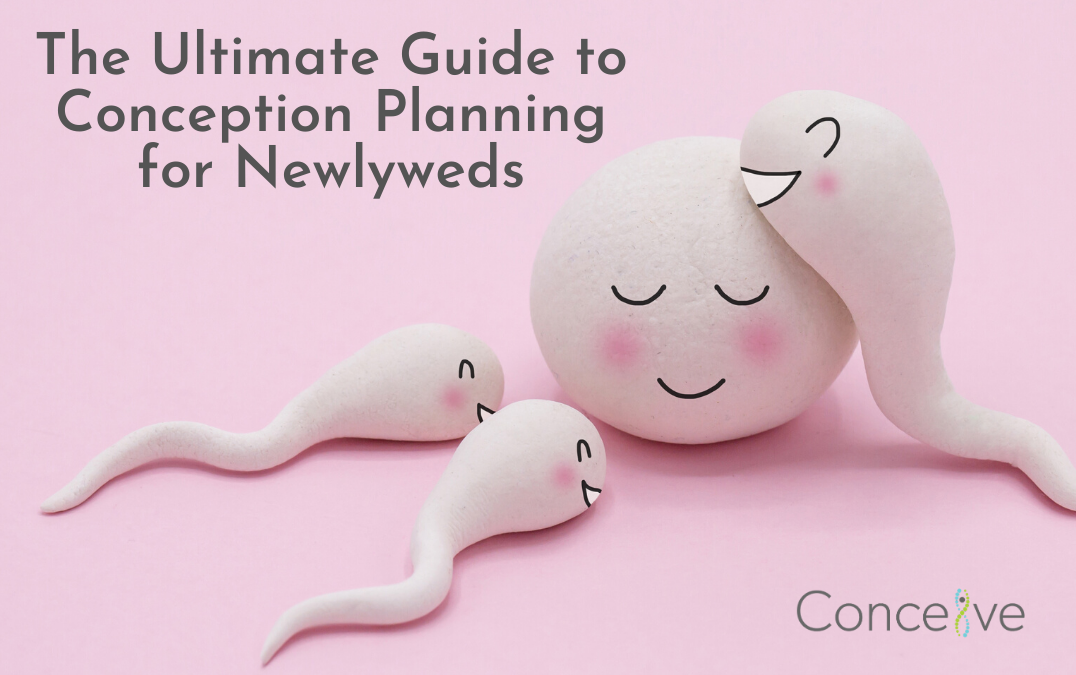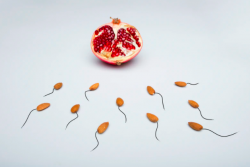So you got married, and you’re looking forward to kids – but maybe not quite yet. Awesome!
Time to start planning your conception – just like you planned your wedding.
I want to put it into perspective. We spent a year (or more?) planning our weddings. We knew we needed to book the hall first (way in advance) and then the photographer/caterer we really wanted. Then we spent time thinking about and finding the perfect dress, the invites, the colour scheme/florals. Lastly we put our energy into the details and decor, the seating plan, the last minute touches and decisions. All of this was socially acknowledged and clear to us, and we knew how to tackle it – or we hired a wedding planner to help us!
I want us to start thinking about starting a family a year in advance. The way we plan our weddings, let’s plan for a baby. Because in doing so, we can troubleshoot issues well in advance to make trying to conceive smoother. We can iron out hormone issues, make sure our cycles are regular, track our ovulation. And we can be on the lookout for signs that we may need to call in some help.
Doing this is even more powerful than achieving pregnancy: we can actually improve the health of our future baby, and reduce asthma, eczema, allergies and more, because healthy eggs and sperm make all the difference.
We can furthermore reduce miscarriage risk, because factors like hormone dysregulation (e.g. in PCOS, low progesterone), nutrient deficiencies (like Vitamin D), and uncontrolled autoimmune disease (e.g. thyroid antibodies) all play a role in miscarriage risk – and these risk factors are manageable with the right support, information, and plan.
Here are the steps we should look at in advance of trying to conceive (TTC):
6-12 months prior: get hormones and menstrual cycles on track.
- Remember how you spent so much time trying NOT to get pregnant? And probably took birth control for a good long time? It masked any problems with hormones and your cycle that you may have.
- Hormones can take some time to re-regulate. Once you come off birth control, it will take up to 6 months for your cycle to come back and settle into a regular pattern.
- This is really important: start tracking your cycles! Use whatever app you like, there are lots of great free ones out there (they are all pretty equal in terms of quality). We’re going to use it to log data, not necessarily to tell us exactly when to TTC (more on that later).
- If you have underlying PCOS, endometriosis, fibroids, etc., we will want 6-12 months to really work on these underlying conditions.
- How do I know if I have one of those underlying conditions? Anyone who experiences the following should have a professional work-up:
- Painful periods
- Heavy periods (changing a pad/tampon every 1-2 hours on your heaviest day)
- Pain with intercourse, or pelvic pain of any type at any point in your cycle
- Cycles that are close together, like every 25 days or less. If you’re getting your period every 3 weeks get a workup! )))
- How do I know if I have one of those underlying conditions? Anyone who experiences the following should have a professional work-up:
- You should have basic hormone testing done at this point, 6-12 months out, to see what’s going on and what we will need to do to correct it. This should include your day 3 estrogen, FSH, LH, and your day 21 progesterone and estrogen (at a bare minimum).
- Other hormones that should be examined are:
- Thyroid – you could be within the “normal” range on bloodwork (under 4), but for TTC you want to be under 2.5.
- Prolactin: if you have a child already and are TTC again, breastfeeding MAY get in the way of ovulation. For some women it does, for others it doesn’t. This is where an individualized approach with your Naturopathic Doctor comes in. Some women may have elevated prolactin for other reasons. We need to test it or it will interfere with ovulation.
- Testosterone and all of its metabolites: your testosterone might be normal, but your DHT might be high. Have this tested if you experience acne, hair loss from your scalp hair but excessive hair growth on your chin, neck, moustache area.
- Insulin: this will tell us if you are insulin resistant, and therefore have PCOS that could interfere with regular cycles and ovulation. It will also tell us whether we need to modify your diet (and how).
6-12 months prior: address autoimmune conditions
This will require a customized approach that may require diet changes (avoiding certain foods that may be flaring your immune system), supplements to calm down the immune system, and nutrients to balance you out (like Vitamin D).
The most common autoimmune conditions we treat, as they relate to fertility, are:
- Hashimoto’s: this is a condition when a patient has antibodies to their own thyroid. It is a very simple blood test, but is seldom done.
- Anyone who is TTC should have this test done.
- 60-90% of hypothyroid patients (who have a TSH above the ideal 2.5 for TTC) have thyroid antibodies, they have just never been tested.
- Someone may not have any symptoms at all when they have these thyroid antibodies. Or you may have general symptoms of hypothyroidism (sluggish energy, weakness, hair loss, cold hands and feet, coarse dry hair or skin, muscle cramps and aches, constipation)
- Test: anti-TPO, anti-TG.
- Endometriosis: this is being classified as an autoimmune condition and/or a hormonal condition.
- It is only diagnosable by laparoscopy, a surgical procedure. In the fertility world, we use a blood test called the CA-125 to assess whether you may have endometriosis. The blood test is still controversial, and it may show a false negative for 15% of cases (meaning, 15% of patients who actually DO have endometriosis will have a negative CA-125).
- All patients with pelvic pain during any point of their cycle, or pain with penetrative sex, or pain with bowel movements should be evaluated for endometriosis, and treated with a comprehensive team including a medical doctor, a pelvic floor physiotherapist, and a naturopathic doctor.
6-12 months prior: start greening your household products
Many studies show the links between certain common household chemicals and fertility. My favourite one is “fragrance,” which is in *everything,* and is made up of phthalates (pronounced “THAL-ates”) that artificially raise estrogen in the body.
The most important thing I want you to know is that sperm in particular are VERY sensitive to their environment. They are like the canary in the coal mine, and will be one of the first things to tell us that a person’s health is off, even before he has obvious health concerns.
For a complete review of how household chemicals can affect our fertility, and how to go about changing that, see here and here.
The reason I have it on the list so far out from TTC is that we won’t necessarily throw all of our chemicals out at once, but replace products with better options as they run out, and that can take time.
Also 6-12 months: get in shape for fertility
If you are significantly above a healthy BMI, let’s open up that conversation. You absolutely don’t need to fit into an unrealistic dress (like our wedding analogy) to have a baby, but losing 5-10% of your weight will significantly improve ovulation (which increases the likelihood of getting pregnant on your own without medical help). And we want to talk about decreasing risk factors of miscarriage, pregnancy complications, and improving birth outcomes.
A Naturopathic Doctor’s approach is to work together on a practical, doable plan to actually help you get results. Let’s focus on nourishing you properly instead of on ineffective restrictions.
3-6 months prior: egg and sperm quality
It takes approximately 100 days to make an egg or a sperm from start to finish. This means that in the month you actually start trying to conceive, the egg and sperm you are using have been impacted by your health during the previous 3 months.
Think about what that means. What were you doing 3 months ago? Did you have a ton of social events and drinking (or in the age of COVID-19, Facetime and drinking)? Were you on crazy work deadlines where you barely had time to eat takeout? Were you feeling stress from finances, family, health, or other factors?
You can still TTC during that time, because let’s face it, life is never perfect or smooth. It means we need to work hard to compensate.
We optimize egg and sperm health by:
- Making sure that when you are sleeping, it’s deep, restorative, and you are not waking up in the night.
- Keeping moving/exercising.
- Get you taking the right supplements, like prenatals with ACTIVE folate (look for folate or 5-mthf on the label, NOT folic acid). Other supplements will depend on the above considerations, and test results.
- Reducing or, if possible, eliminating consumption of alcohol, marijuana, coffee, pop, excess refined sugar, processed food.
- Evaluating your stress levels and how they may be affecting your hormones. Are you waking up in the night? Do you have digestive problems? Headaches? All can give us clues as to how your body is being affected, and ultimately your cycle.
1-3 months prior: when do you ovulate?
If you have irregular cycles (meaning more than 35 days apart, or less than 25 days apart) you likely are not ovulating. Tracking will show us that.
Ways to tell WHEN you ovulate:
- temperature tracking
- cervical mucus changes
- LH strips (ovulation predictor kits) **Note that the commonly used ovulation predictor kits tell you when your body is trying to ovulate, but not whether you actually did.
Bloodwork is the best way to tell IF you have ovulated. There is also a new test on the market called the Proov test, and it is meant to confirm ovulation. We’re pretty excited about it, because it is an at home urine test.
Head over here to get the in depth knowledge on ovulation, and to read about when to time intercourse.
1 month prior: the details
At this point we want to go over some of the details of what you should and shouldn’t do while trying to conceive, and while in the two week wait. Things like:
- How much coffee is ok?
- Can I have a glass (or more?) of wine/beer/other?
- How should I eat?
- Is it true that I should eat pineapple when TTC? (Or any other fertility myth)
- What if I’m having a hard time with anxiety in the two week wait?
- What supplements or medications are safe in the two week wait?
And then: go time!
I want you to know that it can still take perfectly healthy couples 6 months (or maybe more) to conceive, and it doesn’t mean there is anything wrong. Your chances of conceiving every month are around 20%.
As a Naturopathic Doctor I’m used to hearing, “why didn’t I know this years ago?”
Great question.
I wish I had met you years ago, and we could have worked on things before they ever became an issue.
I work in a fertility clinic where couples have tried for a year or more before we even start working together. It’s hard, waiting is hard, putting hopes and dreams on hold is hard.
I’m hoping that if we start to think about TTC well in advance, and plan for it like we plan for our weddings, we can change that.
Use this list as a starting point. Get a health team together, start working on what you can. Trying to conceive is an exciting and magical time, that can also turn into a frustrating and painful time. Our Conceive Health team is here to support you.
To learn more about how you can support your fertility, or to book a virtual appointment with a Conceive Health ND, contact us today.










